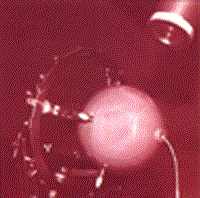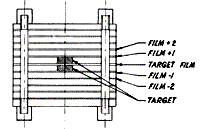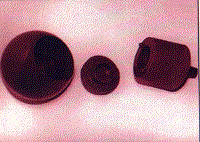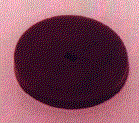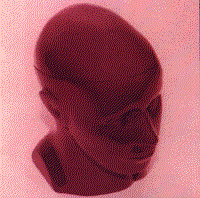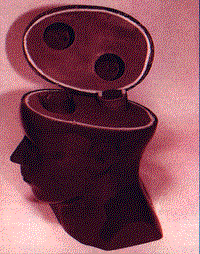|
RSD PHANTOMS FOR STEREOTACTIC
RADIOSURGERY |
|
Spherical
Phantom to Check Mechanical and Dosimetric Parameters of Treatment Units |
|
|
|
Spherical
Phantom in Stereotactic Frame |
DOSIMETRY IN THE SPHERICAL PHANTOM When the center of the sphere is used as the target for testing the
treatment unit, it must indicate the relationship between the point of
maximum dose and the target. These should closely coincide for an accurate
system. A three-dimensional dosimetry unit was chosen for the center of the
sphere to evaluate both the deviation of the maximum dose from the target and
the gradient of the dose along the three orthogonal axes of the sphere.
This
dosimetry unit is a cylinder, built up of alternating disks of dry water (4.0
cm diameter, 2.74 mm thick) and radiochromic film (0.26 mm thick), with a
dry-water disk terminating the cylinder at each end. All disks have two accurately
positioned 3-mm diameter holes for orientation and assembly of all disks. The stack of disks is assembled tightly into a cylinder by threaded
nylon rods, passing through holes with blind cylindrical nuts at each end of
each rod. The nuts mate with recesses in the sphere for precise and
repeatable location.
There are 11 film disks and 12 dry water disks. Each film disk is
marked with numerals from 1 to 11, with the numerals located superiorly and
posteriorly on each disk. 5-mm diameter holes are drilled through the centers of two dry-water
disks, immediately superior and inferior to the film disk at the central
plane of the cylinder. These holes are filled with pins that are denser than
dry water to present a target. Because of the cost of radiochromic film, it will be desirable in many
cases to use standard film disks at the non-central planes of the cylinder
(when restricted data are adequate). In such cases the cylinder assembly can
be completed with exposed standard film.
STANDARD CONE This is a cone mating precisely with a recess in the sphere. It houses
the dosimetric cylinder. For TLD dosimetry, all film is removed from the
cylinder, and an adaptor disk is placed at the center of the cylinder with
the thickness needed to compensate for film removal. The disk has a recess to
house 5 TLD chips, side by side, (3.17 x 3.17 x 0.89 mm thick) at the center
of the sphere.
OPTIONAL CONE This is
molded to locate the measuring volume of an ion chamber at the center of the
sphere. This cone is custom molded to suit the particular ion chamber
specified by the customer. |
|
Head Phantom to Check Accuracy of the Treatment
DOSIMETRY IN THE HEAD PHANTOM Provisions are made for installation of the dosimetric cylinder at two
locations in the cranium. One is on the CC axis of the head close to the
apex. The other is near one side of the head at about ear level. Both
cylinders are perpendicular to the transverse planes of the head. Since the dose at only one target location is to be measured at a
time, the other location is filled with a dry-water cylinder with no
dosimetric provisions. The target location can be defined uniquely by an
initial CT scan.
|
|
|
|
EXPOSED
RADIOCHROMIC FILMS Maximum
dose displaced from center film (target) |
|
ORDERING INFORMATION |
|
|
MODEL |
DESCRIPTION |
|
ST-1100 |
Complete Spherical Phantom System Includes:
|
|
|
OPTIONS |
|
ST-1105 |
Adapter for TLD Chips |
|
ST-1106 |
Truncated Cone for Ion Chamber (includes molding to suit ion chamber
as specified by customer) Note: If both the sphere and head are purchased, only one dosimetric
cylinder is needed. |
|
ST-1150 |
Head Phantom
Includes:
|
|
|
SPARE PARTS (for both Sphere and Head) |
|
ST-1107 |
Dosimetric Cylinder |
|
ST-1108 |
Radiochromic Film Disks (Set from No.1 to No.11) |
|
ST-1109 |
Single Radiochromic Film Disk (any number) |
|
ST-1110 |
Disks of Exposed Standard Film |
|
ST-1111 |
Cylinder Assembly Rod |
|
ST-1112 |
Cylinder Assembly Nut |
|
ST-1113 |
Cylinder Target Rod-Film |
|
ST-1114 |
Cylinder Target Rod-TLD |
© Elimpex-Medizintechnik, Spechtgasse 32, A-2340 Moedling, Austria
phone +43-2236-410450
fax +43-2236-410459
